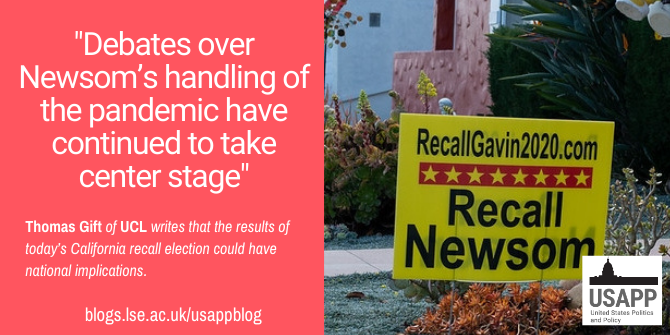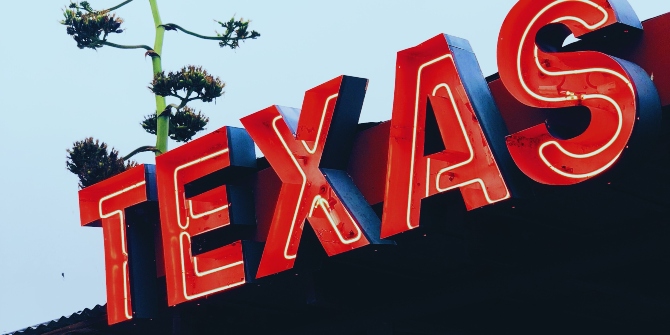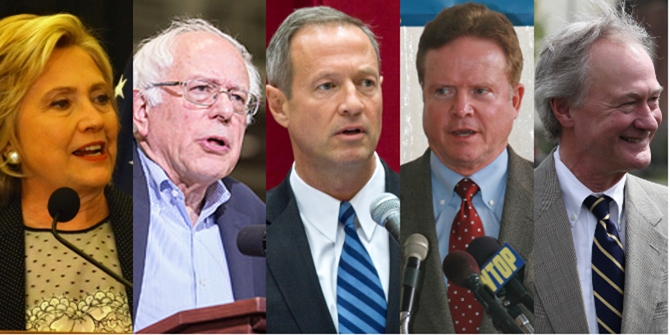 California’s Democratic Governor Gavin Newsom will today try to avoid becoming the second leader of the state in two decades to have his position recalled. In this Q&A, Thomas Gift examines the motivation behind the recall, what the process entails, and the potential implications for California—and the country.
California’s Democratic Governor Gavin Newsom will today try to avoid becoming the second leader of the state in two decades to have his position recalled. In this Q&A, Thomas Gift examines the motivation behind the recall, what the process entails, and the potential implications for California—and the country.
What’s the impetus behind the California recall?
The push for Governor Gavin Newsom’s (first elected in 2018) recall technically started back in June 2020. But the trigger that ignited the effort in earnest was a photo from last November that surfaced of Newsom attending a party at a restaurant while not wearing a mask. That fueled claims of hypocrisy, especially among Republican critics already dissatisfied with Newsom for backing some of the strictest COVID-19 protocols in the country. The result was a petition for a recall, which by March had received more than the approximately 1.5 million signature threshold required.
How does the process work? Who’s Newsom’s competition?
The recall process itself is fairly straightforward. Via mail-in-ballot, Californians have been asked two questions: first, whether they want the governor replaced; and second, if a majority say yes, then the candidate with most votes will be elected. Right now, 46 different candidates are on the ballot, including Republicans, Democrats, Green Party members, a Libertarian Party member, and independents. Most polling data shows that Republican Larry Elder, a conservative talk radio host, is running most competitively with Newsom.
What’s the expected outcome?
Unless the polls seriously miss the mark, Newsom will retain his seat. According to FiveThirtyEight, the portion of Californians who want to keep Newsom in office is about 57.3 percent, compared to 41.5 who want him removed. So, it’s roughly a 16-point margin. Those numbers have swung up and down dating back to the summer. In early August, for example, the race was essentially a statistical dead heat. But Newsom has gained considerable ground over the last month, giving him some breathing room going into today.

“How Oddly Together They Are” (CC BY-NC-SA 2.0) by Joe Wilcox
Are recalls usual in California?
This isn’t the first time we’ve seen a gubernatorial recall in California. In 2003, Republican Arnold Schwarzenegger was elected governor over Democrat incumbent Gray Davis (who had faced accusations of mismanagement following the 2001 California electricity crisis) through a similar process. Recalls are controversial, however. Some critics say that, procedurally, the bar for initiating a recall is set too low. Especially with the reduced barriers to organizing petitions online and through social media, there’s concern that parties out of power can “weaponize” recalls to overturn election results they don’t like.
What issues have defined the campaign?
COVID-19 has undoubtedly been the central issue looming over the election. It’s what activated support for the recall, and debates over Newsom’s handling of the pandemic have continued to take center stage. One of Newsom’s final pitches to voters has been to criticize opponent Larry’s Elder’s stance on vaccines, and to promise to advocate for certain vaccine mandates. But other issues matter, too—even if they’ve been less salient. Chief among them are perennial concerns about affordable housing and homelessness, climate change, and unemployment.
Does the race have any implications beyond California?
Some experts think that the recall could be a harbinger for the 2022 Congressional midterms. That’s one reason why President Joe Biden has been campaigning with Newsom, telling Californians that “[t]he eyes of the nation are on you.” Another X-factor—however unlikely—is that a US Senate seat could even be at stake. California Senator Diane Feinstein will be nearing 90 years old soon, and if a vacancy were to occur, the governor would select her replacement. That mere prospect could have huge national implications due to the current 50-50 split in the Senate.
- These remarks are based in part on an interview by Thomas Gift on Euronews on September 14, 2021.
Please read our comments policy before commenting.
Note: This article gives the views of the author, and not the position of USAPP – American Politics and Policy, nor the London School of Economics.
Shortened URL for this post: https://bit.ly/3k6ldJ0
About the author
 Thomas Gift – UCL
Thomas Gift – UCL
Thomas Gift is Associate Professor of Political Science at UCL, where he is director of the Centre on US Politics (CUSP).





